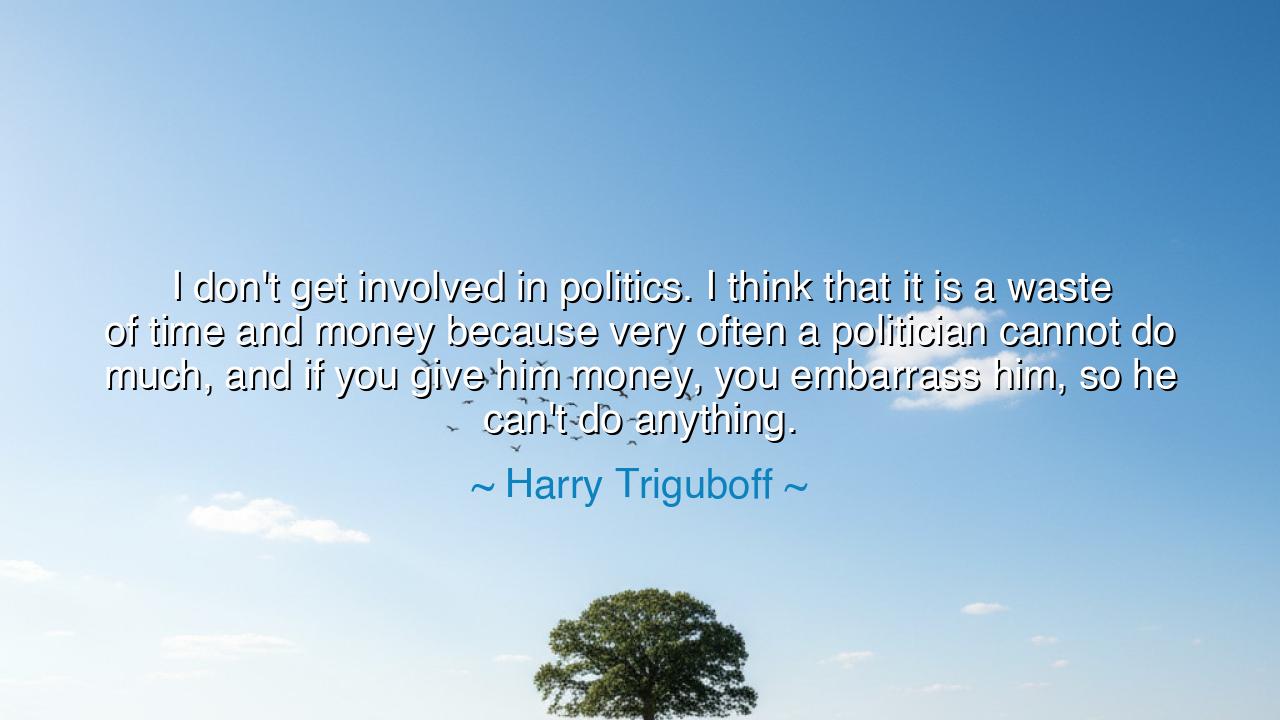
I don't get involved in politics. I think that it is a waste of
I don't get involved in politics. I think that it is a waste of time and money because very often a politician cannot do much, and if you give him money, you embarrass him, so he can't do anything.






The words of Harry Triguboff ring with the weariness of one who has watched the stage of politics and found it wanting. “I do not get involved,” he declares, for he sees it as a waste of time and money, a labyrinth where effort is swallowed and results rarely emerge. To him, the politician is less a master of destiny than a figure shackled by weakness, unable to act with freedom, unable to deliver even when aided. Such is the disillusionment of one who has chosen to labor with his own hands rather than entrust his hopes to the machinery of government.
This sentiment is as old as civilization itself. In the days of Rome, the farmer Cincinnatus was summoned from his plough to be dictator in a time of crisis. He delivered victory and then returned at once to his fields, declaring that the soil was more honest than the Senate. He saw, as Triguboff sees, that politics is often a realm of delay and entanglement, while the work of one’s own craft yields clearer fruit. The man of action may therefore distrust the man of office, preferring the tangible harvest of labor to the hollow promises of laws.
Triguboff also touches upon the corruption that shadows political life. To give money to a politician is not to empower him but to ensnare him in embarrassment—to bind him with debts of loyalty that weaken his judgment. Many rulers across history have fallen thus. Think of the late Byzantine emperors, who took gold from foreign kings, and in so doing lost both their honor and their empire. The gift of coin, meant to strengthen, became a shackle of shame.
Thus, his words are both a renunciation and a warning. To place one’s faith in politics alone is to build on shifting sands, for the politician is often powerless, and when tied to wealth, even less free. Better, then, to cultivate strength in one’s own sphere, to build where one has true mastery, and not to waste spirit in the endless maze of factions and promises.
O children of the future, hear this wisdom: do not despise politics, for it governs much of life, but do not enthrone it as the source of all hope. Know its limits, and know also its snares. True power lies not always in the chambers of government, but in the hands of those who work, who create, and who stand unshaken by the tides of intrigue. In this balance—between independence and vigilance—dwells the secret of lasting strength.






THTran Huyen
Triguboff’s sentiment about politics being a waste of time and money reflects a common frustration with the perceived ineffectiveness of politicians. But I wonder if this view overlooks the importance of collective action and citizen engagement. If politicians are often powerless or constrained, doesn’t that mean we should focus on empowering them through public demand and participation? Can we change the system from the outside in, or does it require more direct involvement from within?
AAnh
While I can see where Harry Triguboff is coming from, his statement suggests a resignation that I find concerning. Is it really a waste of time to get involved in politics, or is it more about finding the right ways to engage? If we give up on politics entirely, we risk allowing the status quo to continue. What if the solution is not disengagement, but pushing for more effective and transparent political systems?
DTDong Tra··
Triguboff’s reluctance to get involved in politics is understandable given the often slow and frustrating nature of political systems. However, I think the argument that giving money to politicians only embarrasses them might oversimplify the issue. If we truly want change, shouldn’t we be working to hold politicians accountable rather than assuming they are powerless? Could focusing on structural reform and transparency be a way to empower politicians to do more?
UGUser Google
I can understand Triguboff’s frustration with the political system, especially if one feels that politicians are often limited by outside forces or unable to enact meaningful change. But does this mean we should just give up on politics altogether? Aren’t there ways to be involved that don’t necessarily mean directly supporting politicians? Could activism, advocacy, and grassroots movements be the key to making real change without relying on politicians themselves?
DAduc anh
Triguboff’s statement seems to reflect a deep cynicism about politics, suggesting that involvement is futile. However, this view makes me wonder: if we’re not engaging with politics, what’s the alternative? Is it better to remain neutral and uninvolved, or is there a middle ground where we can hold politicians accountable without feeling like we’re wasting time or resources? Could a more engaged and informed public make a difference in the system?